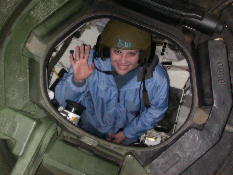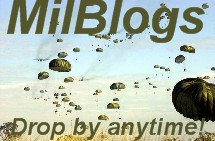April 30, 2004
1. TABLE 15
Amazing results. UN-sanctioned involvements ranked much lower on the "how do you think [country of deployment] will be after American soldiers leave" scale than Iraq does. In the other missions, the soldiers thought that their involvement meant very little in the long-run, but in Iraq it appears that they believe their presence will make a positive difference. That says something huge! Our soldiers appear to be saying that the Iraq deployment has focus and that, being run by Americans, has a much higher chance of success than if it were run by the UN. Fascinating finding, in my opinion.
2. TABLE 17
There is a big difference between officer morale in OIF and in WWII; in OIF there's a much higher percentage of reported low morale. Reasons for this? Other than the fact that maybe officers feel more comfortable griping these days, I can't come up with anything.
However, this was a survey of only 389 soldiers, so that means only 54 people out of all of the deployed soldiers said they have low morale. I have no idea how they got the results from WWII, but if the sample size is different, then the results mean little. I have not been able to find the original, and Blackfive didn't post a link, so I'm not sure where the WWII data comes from.
See, I did learn something from How To Lie With Statistics!
MORE TO GROK:
Since I am a grokking tyro, I enlisted the help of a bigger mind to check out the numbers. Mr. Den Beste wrote me back last night; as usual, he thinks of things I didn't catch:
Given your specific situation, it's easy to see why you'd be concerned about
this.I'm not so sure that the difference to which you refer is really very significant or very mystifying. Officers, quite naturally, feel more responsible for a situation than enlisted, and the situation in Iraq is not really the same as it was in Europe. Americans knew more about Europe and understood the local culture much better, for one thing. Iraq is a more alien place.
A different thing I find myself wondering about is just when it was that the WWII survey happened. If it was about one year after VE day, that would be a
lot different than if it was perhaps three years after VE day. Europe was also pretty unsettled in the first year, but by three years things had stabilized quite a lot. Thus officers, feeling responsible, would have indicated greater comfort at the three year point than at the one year point.Frankly, I didn't really see anything in that report that I found too surprising, or anything that worried me deeply. (Obviously I wish it were better than it is...)
Posted by: Sarah at
09:46 AM
| Comments (1)
| Add Comment
Post contains 489 words, total size 3 kb.
48 queries taking 0.0692 seconds, 165 records returned.
Powered by Minx 1.1.6c-pink.














